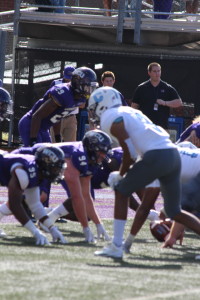“If practice runs late tonight I know I’ll have to pull another all-nighter for my exam tomorrow.”

The Catamounts defense lining up before the snap. Photo by Marcus Smith
Worries like this cross the mind of Bella Pighini, a member of the women’s soccer team at WCU, all the time. As a college student and athlete, a lot stress stems from balancing and managing the two.
At WCU, student athletes are enrolled full time while adhering to high expectations within the athletic department. While each team operates differently, the pressures and demands remain the same. As a Division I student athlete, schedules can oftentimes be overwhelming and stressful. Compared to other collegiate levels, Division I athletes have the highest expectations.
Natalia Icen, a junior on the women’s soccer team, explains how she and her fellow teammates have experienced first-hand how student athletes struggle with mental health.
“I’ve seen some get depressed with all the pressure. It’s not always a positive environment at practice. It’s intense,” Icen said. “The environment itself and having to perform on a daily basis affects you as a person.”
In addition to the stress of balancing the workload of being both a student and an athlete, transitioning from a high school sport to a college sport can also cause stress.
“Managing your time when transitioning from high school to college is the hardest part. This affected my mental health in the beginning of my freshman year. It caused me to stress more and worry about things that were actually under control,” Tyrie Adams, quarterback on the football team, said.
While it can be exhausting to juggle practice and games, there is the added stress of maintaining a good GPA. The stress of keeping up with academic requirements can be a major reason behind the mental health problems in student athletes. No one understands this better than the Director of Academic Support in athletics, Anita Puerto.
Puerto works with student athletes every day to see how they are maintaining their academic standards set in place.
“There is a lot of negative mindset. A lot of fear of ‘doing it wrong’ and getting punished,” she explains.
For athletes, “punishment” typically involves extra workouts. The risk of an exhausting physical punishment looms over athletes every day.
“There are minor, half-joking panic attacks. There is a lot of negative speech that sets up their entire approach to a situation. There is more drive to ‘just do it’ so they don’t have to run,” Puerto explains.
This is why the academic support provided for student athletes focuses on time management. Part of time management is having the appropriate resources available. These resources include free printing, study cubicles, and allotted time to get their studying in every day.
Apart from making good grades and performing well, injuries can play a significant role in the mental wellness for student athletes. Injuries that keep athletes from participating in practice and games can be detrimental to mental health. This, paired with the risk of sustaining a career-ending injury, adds to an athlete’s anxiety. What if something you have been preparing for most of your life is suddenly taken away from you? WCU Athletic Trainer, Nicole Bohannon, is familiar with the stress that injuries can have on student athletes.
“You see a lot of kids go through what’s called ‘athletic identity loss’. A major injury that’s season ending can cause this. When you’re not with the team anymore, you feel like you’re not an athlete anymore,” she said.
Situations such as this make us wonder what WCU is doing to help student athletes when it comes to their mental health. The counseling and psychological services (CAPS) is present in the training room at least once a week.
“The Sports Medicine Department here really tries to work with CAPS. It can be difficult to get appointments right away, sometimes it takes up to 3 weeks, but if they need it we get them in,” Bohannon said.
The NCAA official site offers some insight as to why student athletes mental health is often overlooked:
“When you think of a student-athlete’s health, you probably are inclined to think primarily of the person’s physical/medical condition and what effect the injury will have on athletic performance. A student-athlete’s “mental health” might be viewed as secondary to physical health; however, it is every bit as important. It makes little sense to try to separate the mind and body.”
Bohannon also points out that some sports are more susceptible to mental health issues than other. Athletes who participate in individual-focused competition deal with a much higher degree of responsibility and pressure than team sports.
“The sports that are more individualistic tend to struggle more with mental health. They have a bit more stress on them as individuals versus a team sport where you have teammates that can pick up the pieces for others who aren’t performing,” Bohannon said. “Sports like wrestling, track, or gymnastic can have a lot of trouble.”
This is due to the personal responsibility and pressure individualistic team sports place on their athletes. When your performance becomes a direct reflection of your team’s success, it can seriously impact the mental health of that individual.
Mental health should not be taken lightly and the student athletes at WCU are facing this each and every day. The prioritization and awareness of student athlete mental health is an important step in the improvement of the mental health on WCU’s campus.


